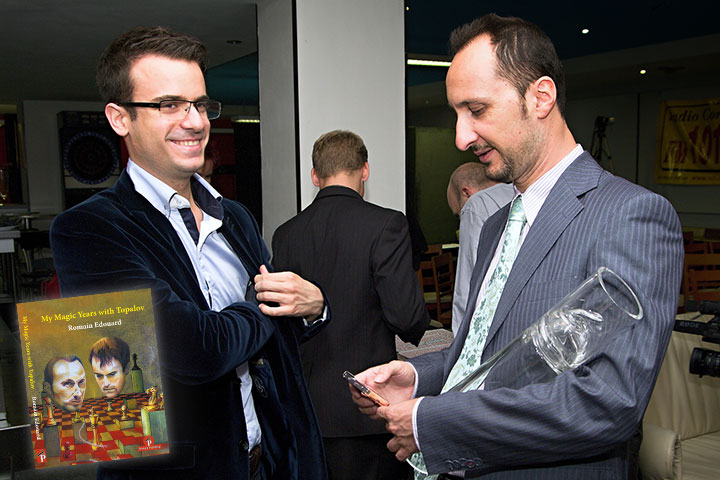


Romain Edouard is a grandmaster and, with a rating of 2640, currently number 4 in France. He is also a prolific writer and Editor-in-Chief of Thinkers Publishing. Recently he published My Magic Years with Topalov in which he chronicles his work as a second for Veselin Topalov.
JF: When did you have the idea for this book?
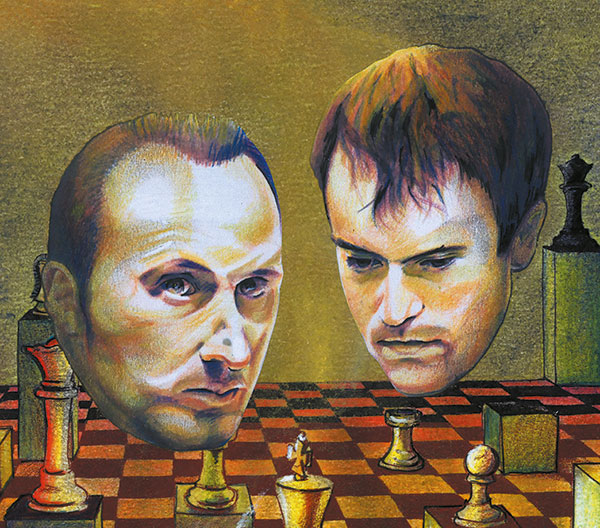 RE: I had this idea after Veselin and I stopped working, back in 2014. As the title indicates, those years were magic. When I started working with him, I had no idea we would become such close friends, and so quickly. I thought it was a perfect subject for a book: life preparing high level tournaments, how to we get from zero to a strong novelty, inside stories, wonderful dynamic games. Last but not least, the media has often been unfair towards Vesko since the Elista match in 2006, and I wanted to present him from a different perspective, as he definitely deserves it.
RE: I had this idea after Veselin and I stopped working, back in 2014. As the title indicates, those years were magic. When I started working with him, I had no idea we would become such close friends, and so quickly. I thought it was a perfect subject for a book: life preparing high level tournaments, how to we get from zero to a strong novelty, inside stories, wonderful dynamic games. Last but not least, the media has often been unfair towards Vesko since the Elista match in 2006, and I wanted to present him from a different perspective, as he definitely deserves it.
When did you start working as a second for Topalov and when did the cooperation end?
We started in 2010, and it ended after the Candidates tournament in 2014.
"My Magic Years" contains stories, insights you had during your work as a second but first of all a lot of deeply analysed games. Obviously, you put a lot of work into the book. What motivated you to write this book?
Yes, actually, I took four years to write the book. Don’t get me wrong: it wasn’t a full time job for four years! I just selected all the games I considered interesting for the readers. Then I started writing down stories from time to time, just when I remembered them — stories away from the board, but also inside, like how an idea came up. When analysing the games and especially openings, I tried not to hide anything crucial, but I did try to keep only the most important things and to explain all the ideas and principles, rather than giving endless computer lines.
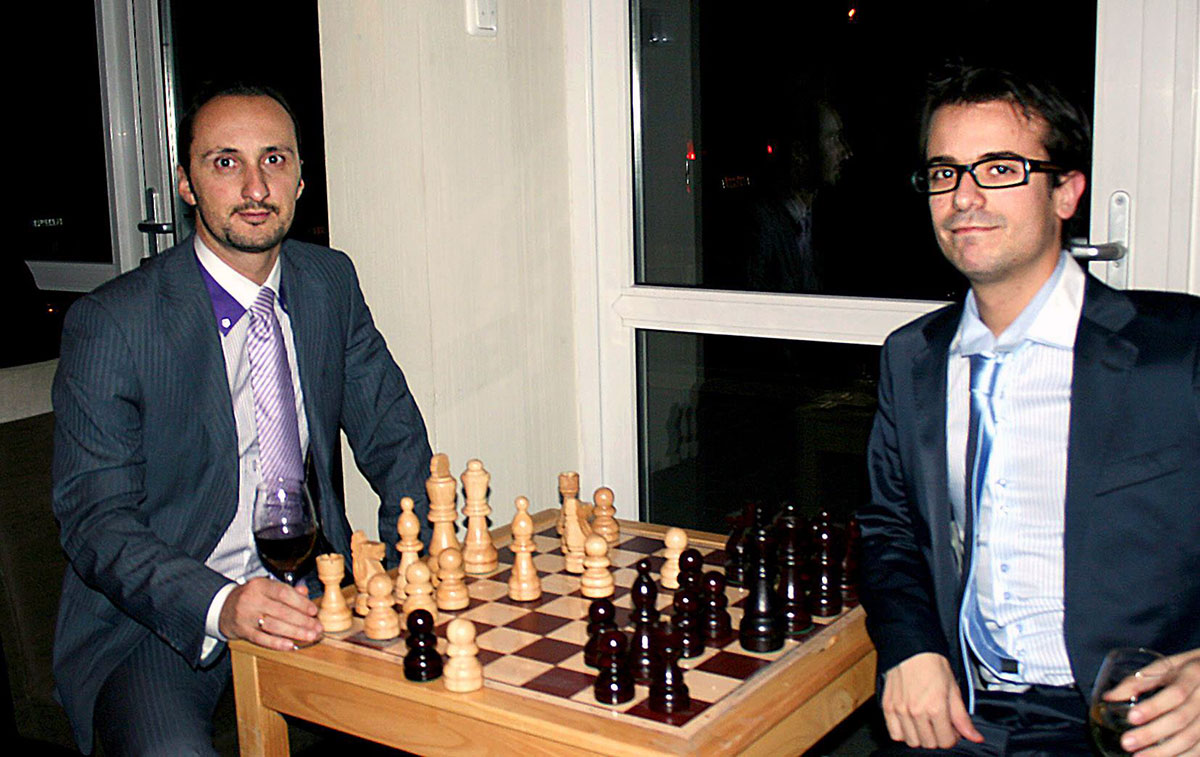
Topalov and Edouard in Wijk aan Zee | Photo: JM Péchiné
Now, after all this work, how does it feel to have the finished book in your hands?
It feels great. These years with Vesko weren’t just time and a job. Now they’re on paper, and paper lives forever! That’s a present I made to myself, mostly.
Tell us a bit about your own career: when and how did you start to play, what fascinated you about chess when you started and what still fascinates you about the games, how did you become a grandmaster and what are your plans as a player and as a publisher?
I started playing at age 5. I loved chess, but it was just a hobby. I was doing very well at school and was intending to continue doing so. But, slowly my passion for chess grew, and chess overtook school. I passed my final exams at age 18, but only to have an educational background. My choice, at this age, was clear: I wanted to play chess professionally. I like the way it’s been going. I won several medals at international youth championships, became a GM, and won several strong tournaments like the French Championship or the Dubai Open. I am also proud to be part of the French National Team since 2011.
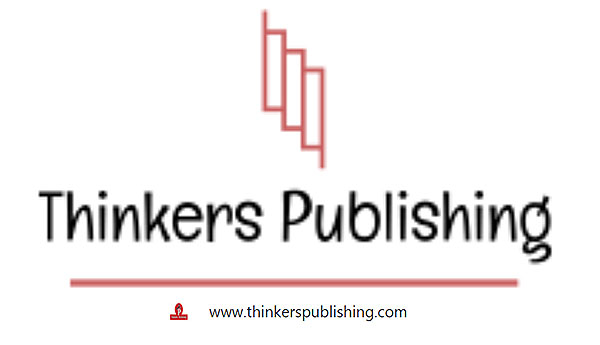 My plans as a player are to get my rating back towards 2700, where I used to be, and to try to win many more events. As a publisher, I simply want Thinkers Publishing to become the Number One Chess Book publisher in the World. And we do everything to achieve that goal, although don’t take me wrong: we consider other chess publishers as friends. The market is large enough for everyone.
My plans as a player are to get my rating back towards 2700, where I used to be, and to try to win many more events. As a publisher, I simply want Thinkers Publishing to become the Number One Chess Book publisher in the World. And we do everything to achieve that goal, although don’t take me wrong: we consider other chess publishers as friends. The market is large enough for everyone.
“My Magic Years with Topalov” describes the work of a second. Can you briefly sum up how the work of second looks today at a time when computer preparation is becoming more and more important?
Concretely speaking, during a tournament a second has to work overnight in order to discover as many things that he couldn’t discover earlier, for example during regular training sessions with the player he helps. He should manage a clever use of his brain (his own feeling) together with a strong engine. A bad second will just push the computer button — but, as Veselin has said, “my daughter can do that”. A good second should be able to find ideas that the engine cannot find, and then see how much it is worth when you turn the engine on.
Obviously, the idea is always to get the opponent into a position he has never seen, or overestimated (e.g. following a misleading computer judgement). Some of our opening tries were refuted at once, others were dubious, others difficult to refute for a human, others were just good. Topalov was happy to play any idea that belongs to the last two categories.
This sounds like really hard work. Why, then, were these years “magic”?
These years were magic because we were sometimes finding amazing ideas. We had fun together as friends, and with my help Veselin won the GP series 2012-2013. That was quite an achievement. Besides that, I improved my chess a lot thanks to Veselin. Not just by working together — sometimes he was just showing me things that he judged could be useful to me. He is just a generous person.
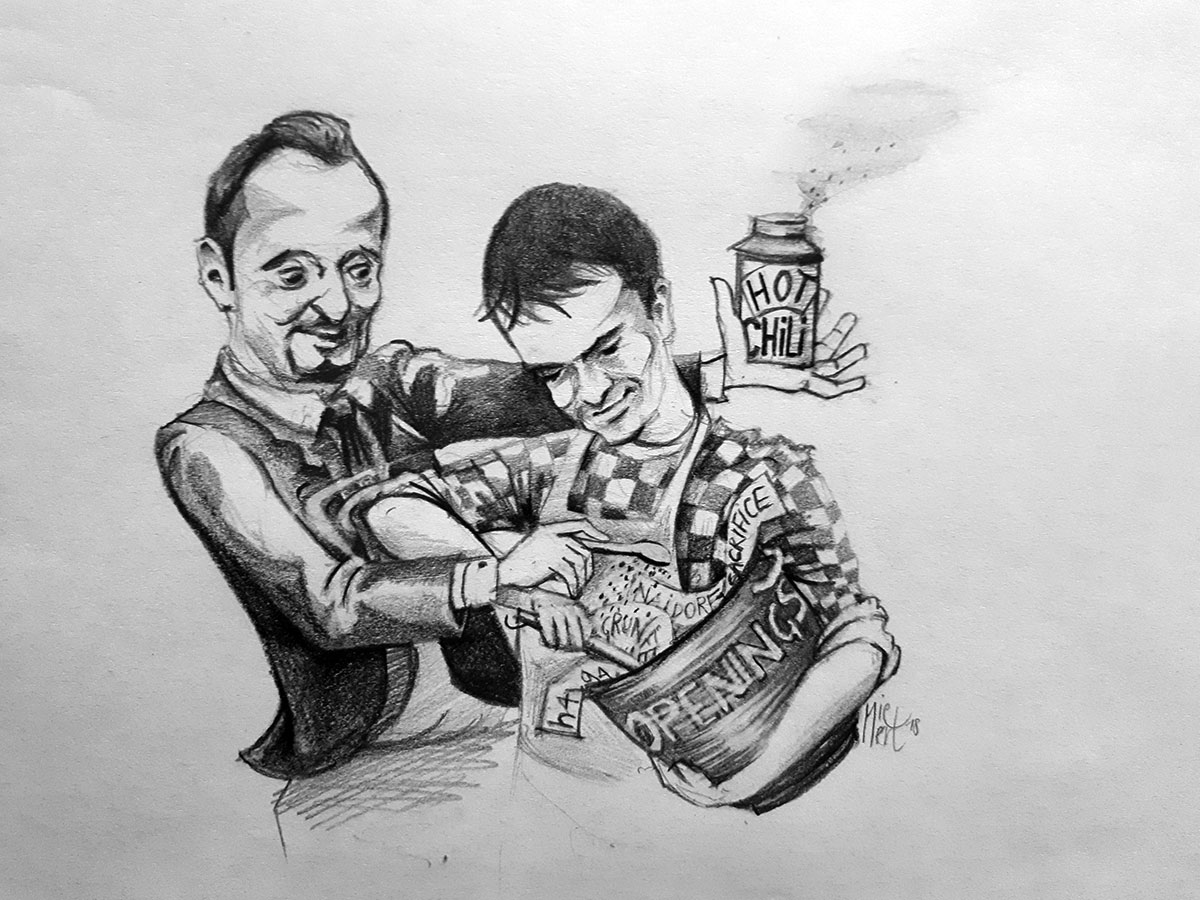
Caricature of Topalov and Edouard | Drawing Mieke Mertens
Do you remember a moment or moments of your work with Topalov that was or were particularly magical?
One magical moment was when we realized how tricky the move 8.♗e5!? was, that he used against Kramnik in the Candidates 2014.
Actually, no, this was just a nice professional moment. The magical moment was when he won! We found several other new ideas of this kind, like 14.♗a4! against Nakamura, or 12.♘e5! against Aronian, as Veselin himself explains in the preface of the book. [Both from the 2011 Amber Blindfold and Rapid Tournament.]
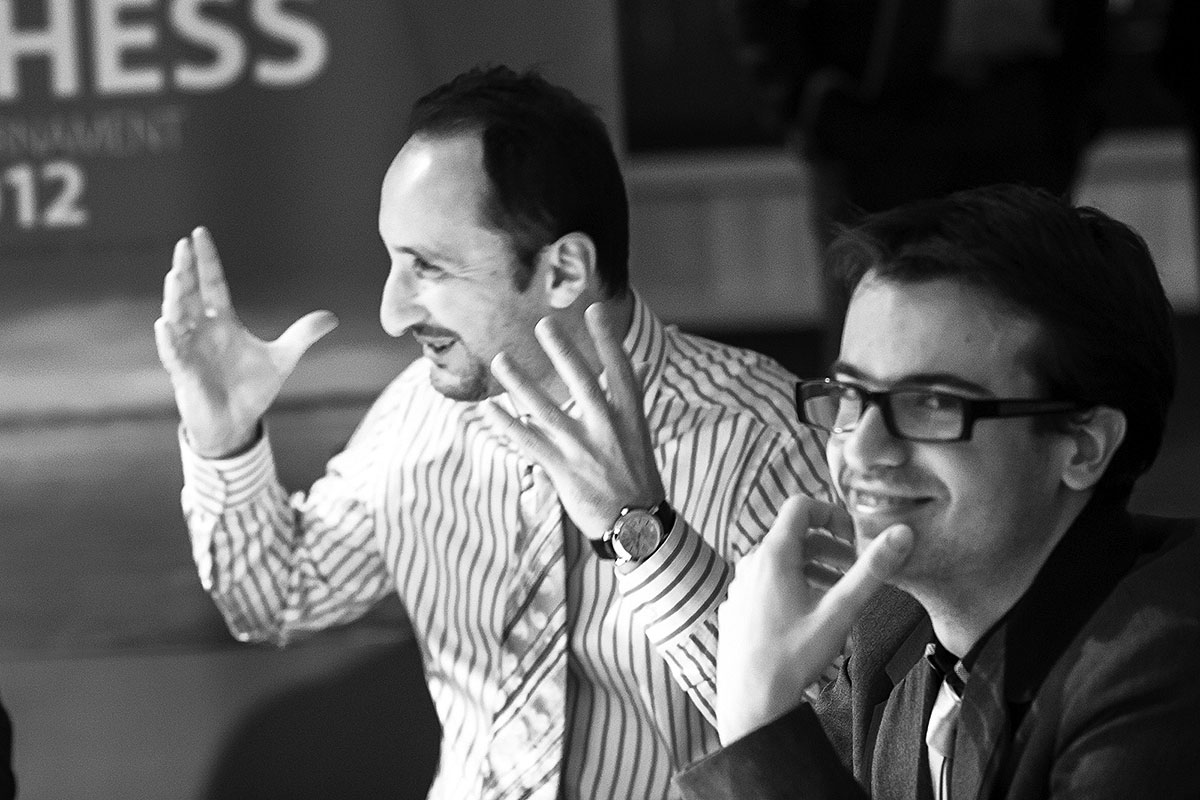
Topalov and Edouard at the Tata Steel Chess tournament | Photo: Fred Lucas
Other players who write about their experiences as seconds often mention how tricky this work is: if the player succeeds the merits go to him, if he fails the second(s) are often blamed. How did you experience/cope with this part of the work as a second?
Veselin never blamed me for anything. Maybe sometimes he should have, but he never did. For example, our first classical event working together, Tata Steel 2011, went horribly for him, despite good positions in most of the openings. He was aware of that, and told me I wasn’t responsible for his losses. Immediately after he asked for my schedule 12 months in advance, so I could help him in every single event.
What did your work for Topalov for your own chess: did you improve or did all the hard work dampen your appetite and motivation for chess?
Of course — I’m sure I would never have crossed the 2700 barrier, maybe also not won the Dubai open, if I had never had a chance to work with him.
A huge part of the work of a second is opening preparation. But who owns new ideas? Can you play the untested opening ideas you prepared for Topalov?
Ideas can come from the player, the second, or from both when having a training session. In all cases, then it’s a second’s job to check its availability, and then advise or not advise “his” player to go for it. Generally speaking, the ideas first belong to the player, but after a certain amount of time the second can use them as well. It depends, of course, on the terms of the agreement between player and second. In my own arrangement with Veselin, I had very few restrictions.
Reading about the breadth and the depth of (opening) preparation by top grandmasters can be frightening and disheartening. Is this kind of preparation a guideline or should amateurs take a different approach to opening study?
I think amateurs should have enough information watching games and reading books. When you work for a top-level event, you sometimes need to look for a small improvement on move 25. Compared to the amateur game, it’s a different world — and to be clear, it’s probably more interesting from the amateur side.
You write that you looked at all games by Topalov from 1985 to the present to write “My Magic Years”. What do you think is Topalov’s greatest strength and what is his contribution to the development of chess and chess history?
When he became a World Champion in 2005, his level was simply unbelievable. Playing in his aggressive style, he wasn’t too far from the great Kasparov. He definitely contributed a lot to the way people see chess, playing such dynamic games, and also to openings, especially at the time he was killing everyone playing the Najdorf.
The book focuses on the games by Topalov. To conclude, maybe you can share one of your own games — a game you liked and maybe was inspired by your work as a second?
Actually, I beat Anatoly Karpov in a rapid match thanks to a very aggressive idea Veselin and I had in stock. That game is analysed at the end of the book!